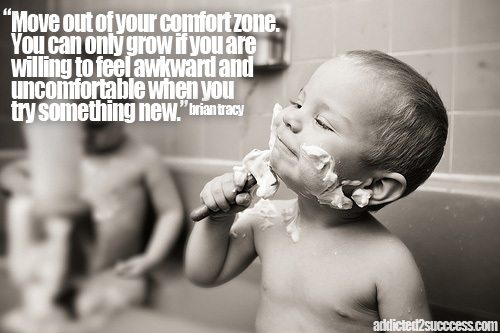Life
8 Things You Need To Know About Getting Out Of Your Comfort Zone

The comfort zone may be a great place to hang out. A number of people may hang out there for their entire life. That is because everybody likes a place where they feel safe.
The problem is staying in a comfort zone may limit your opportunities.
To achieve more and get the most out of your life please consider these 8 things you need to know about getting out of your comfort zone.
1. You do not have to do it all at once
Break your goal into pieces.
For instance, if you completely hate networking, and every time it comes into your mind you imagine having to be charming, witty and making sales. It does not have to work like that.
Networking simply requires you to make friends with several people.
Networking is not about pleasing everybody with your wonderful products and expertise.
Start by selecting a group you wish to visit and then show up and always be friendly. It is that simple.
“Life is a never ending journey of reaching out of our comfort zone. We can always reach new levels.” – Matthew Donnelly
2. Take action
Putting it on paper and creating a plan will not do you any good if you do not complete it with action.
Find a friend who can help you be accountable.
Let them know what you will be doing and then request them to check in with you weekly to find out if you did it or not.
It gives you encouragement to achieve something when you have to report to someone.
3. Change your thoughts
Everyone moves with limiting thought patterns once in a while, but since thoughts drive behavior and feelings, it is very important to try to harness the negative thoughts and replace them with positive, reality-based thoughts.
It is completely true that when we pay attention to positive aspects of life, such thought patterns lead our mind and body system toward success.
4. Picture yourself reaching the next level of success
The brain easily creates new neural conduits when we engage as many senses as possible; thus, it’s important to create a mental picture that’s rich in details.
How would you feel when you reach a major goal? What kinds of feelings, smells, sights, and tastes will you experience when you reach such a goal?
Take few minute breaks during the day to relax, have some deep breaths and run your mental picture.
The more you see yourself achieving your goal, the more likely you will be to move out of your comfort zone, so as to create the new behaviors and thoughts needed to succeed.

5. Engage in a hobby
Some people go wind-surfing or sky-diving to help them experience the body and mind feeling state of doing new things and conquering fear.
You don’t necessarily have to take up high-risk hobbies to move out of your comfort zone. You can try something such as hiking a little higher or longer than usual.
The mental and emotional experience of engaging in a hobby will translate to a great vision.
You will find it easier to try new things, have new thoughts, and try new ways of doing things.
6. Move through fear with action
The best solution to fear is taking action. Take a bold approach to whatever you fear.
Are you afraid of inviting that successful person who might help you out? Do it!
Write a quick script, and practice saying it aloud and then pick up the phone and call.
Do you fear speaking before a group? Perhaps you can join Toast Masters and get to learn how to express yourself in a group where everybody else is also learning.
The stupid thing about fear is that it’s an emotion that’s rarely based in truth.
Do not let some misleading form of reality stop you from making achievements.
Take action and move through fear.
7. Invest into business
When times are difficult, we tend to cut back on our research, development and marketing budget, or new equipment.
Instead of getting ourselves into temptations to slash development-producing spending, find some good ways to invest in a business that will boost your psyche.
This makes us move out of our comfort zone by having faith in ourselves.
“Life begins at the end of your comfort zone.” – Neale Donald Walsch
8. Hire a mentor
If you need assistance moving out of your comfort zone, among the ideal ways of getting support is by hiring a mentor, coach, or a consultant who will help you plan new goals and reach higher levels.
It is obvious that we all want to be successful in life, however, very few people can say that they have achieved success.
One of the major reasons why the majority of the most successful people across the globe achieved extraordinary success is due to the fact that they were able to take risks, think differently, and move out of their comfort zones.
Have these tips been able to help you? What tips would you add to this list?
Did You Know
How Skilled Migrants Are Building Successful Careers After Moving Countries
Behind every successful skilled migrant career is a mix of resilience, strategy, and navigating systems built for locals.

Moving to a new country for work is exciting, but it can also be unnerving. Skilled migrants leave behind familiar systems, networks, and support to pursue better job opportunities and a better future for their families. (more…)
Life
10 Research-Backed Steps to Create Real Change This New Year
This New Year could finally be the one where you break old patterns and create real, lasting change.

Every New Year, we make plans and set goals, but often repeat old patterns. (more…)
Life
9 Harsh Truths Every Young Man Must Face to Succeed in the Modern World
Before chasing success, every young man needs to face these 9 brutal realities shaping masculinity in the modern world.

Many young men today quietly battle depression, loneliness, and a sense of confusion about who they’re meant to be.
Some blame the lack of deep friendships or romantic relationships. Others feel lost in a digital world that often labels traditional masculinity as “toxic.”
But the truth is this: becoming a man in the modern age takes more than just surviving. It takes resilience, direction, and a willingness to grow even when no one’s watching.
Success doesn’t arrive by accident or luck. It’s built on discipline, sacrifice, and consistency.
Here are 9 harsh truths every young man should know if he wants to thrive, not just survive, in the digital age.
1. Never Use Your Illness as an Excuse
As Dr. Jordan B. Peterson often says, successful people don’t complain; they act.
Your illness, hardship, or struggle shouldn’t define your limits; it should define your motivation. Rest when you must, but always get back up and keep building your dreams. Motivation doesn’t appear magically. It comes after you take action.
Here are five key lessons I’ve learned from Dr. Peterson:
-
Learn to write clearly; clarity of thought makes you dangerous.
-
Read quality literature in your free time.
-
Nurture a strong relationship with your family.
-
Share your ideas publicly; your voice matters.
-
Become a “monster”, powerful, but disciplined enough to control it.
The best leaders and thinkers are grounded. They welcome criticism, adapt quickly, and keep moving forward no matter what.
2. You Can’t Please Everyone And That’s Okay
You don’t need a crowd of people to feel fulfilled. You need a few friends who genuinely accept you for who you are.
If your circle doesn’t bring out your best, it’s okay to walk away. Solitude can be a powerful teacher. It gives you space to understand what you truly want from life. Remember, successful men aren’t people-pleasers; they’re purpose-driven.
3. You Can Control the Process, Not the Outcome
Especially in creative work, writing, business, or content creation, you control effort, not results.
You might publish two articles a day, but you can’t dictate which one will go viral. Focus on mastery, not metrics. Many great writers toiled for years in obscurity before anyone noticed them. Rejection, criticism, and indifference are all part of the path.
The best creators focus on storytelling, not applause.
4. Rejection Is Never Personal
Rejection doesn’t mean you’re unworthy. It simply means your offer, idea, or timing didn’t align.
Every successful person has faced rejection repeatedly. What separates them is persistence and perspective. They see rejection as feedback, not failure. The faster you learn that truth, the faster you’ll grow.
5. Women Value Comfort and Security
Understanding women requires maturity and empathy.
Through books, lectures, and personal growth, I’ve learned that most women desire a man who is grounded, intelligent, confident, emotionally stable, and consistent. Some want humor, others intellect, but nearly all want to feel safe and supported.
Instead of chasing attention, work on self-improvement. Build competence and confidence, and the rest will follow naturally.
6. There’s No Such Thing as Failure, Only Lessons
A powerful lesson from Neuro-Linguistic Programming: failure only exists when you stop trying.
Every mistake brings data. Every setback builds wisdom. The most successful men aren’t fearless. They’ve simply learned to act despite fear.
Be proud of your scars. They’re proof you were brave enough to try.
7. Public Speaking Is an Art Form
Public speaking is one of the most valuable and underrated skills a man can master.
It’s not about perfection; it’s about connection. The best speakers tell stories, inspire confidence, and make people feel seen. They research deeply, speak honestly, and practice relentlessly.
If you can speak well, you can lead, sell, teach, and inspire. Start small, practice at work, in class, or even in front of a mirror, and watch your confidence skyrocket.
8. Teaching Is Leadership in Disguise
Great teachers are not just knowledgeable. They’re brave, compassionate, and disciplined.
Teaching forces you to articulate what you know, and in doing so, you master it at a deeper level. Whether you’re mentoring a peer, leading a team, or sharing insights online, teaching refines your purpose.
Lifelong learners become lifelong leaders.
9. Study Human Nature to Achieve Your Dreams
One of the toughest lessons to accept: most people are self-interested.
That’s not cynicism, it’s human nature. Understanding this helps you navigate relationships, business, and communication more effectively.
Everyone has a darker side, but successful people learn to channel theirs productively into discipline, creativity, and drive.
Psychology isn’t just theory; it’s a toolkit. Learn how people think, act, and decide, and you’ll know how to lead them, influence them, and even understand yourself better.
Final Thoughts
The digital age offers endless opportunities, but only to those who are willing to take responsibility, confront discomfort, and keep improving.
Becoming a man today means embracing the hard truths most avoid.
Because at the end of the day, success isn’t about luck. It’s about who you become when life tests you the most.
Change Your Mindset
The Four Types of Happiness: Which One Are You Living In?
Most people chase success only to find emptiness, this model reveals why true happiness lies somewhere else.

In a world driven by rapid technological growth and constant competition, many people unknowingly trade joy for achievement. (more…)
-

 News3 weeks ago
News3 weeks agoBrandon Willington Builds 7-Figure Business by Ignoring Almost Everything
-

 Health & Fitness4 weeks ago
Health & Fitness4 weeks agoWhat Minimalism Actually Means for Your Wellness Choices
-

 Did You Know4 weeks ago
Did You Know4 weeks agoWhy Most Online Courses Fail and How to Fix Them
-

 Business4 weeks ago
Business4 weeks agoIf Your Business Internet Keeps Letting You Down, Read This
-

 Business2 weeks ago
Business2 weeks agoEntrepreneur’s Guide to Pay Stubs: Why Freelancers and Small Business Owners Need a Smart Generator
-

 Business2 weeks ago
Business2 weeks agoThe Salary Shift Giving UK Employers An Unexpected Edge
-

 Scale Your Business2 weeks ago
Scale Your Business2 weeks ago5 Real Ways to Grow Your User Base Fast
-

 Business2 weeks ago
Business2 weeks agoThe Simple Security Stack Every Online Business Needs






























5 Comments